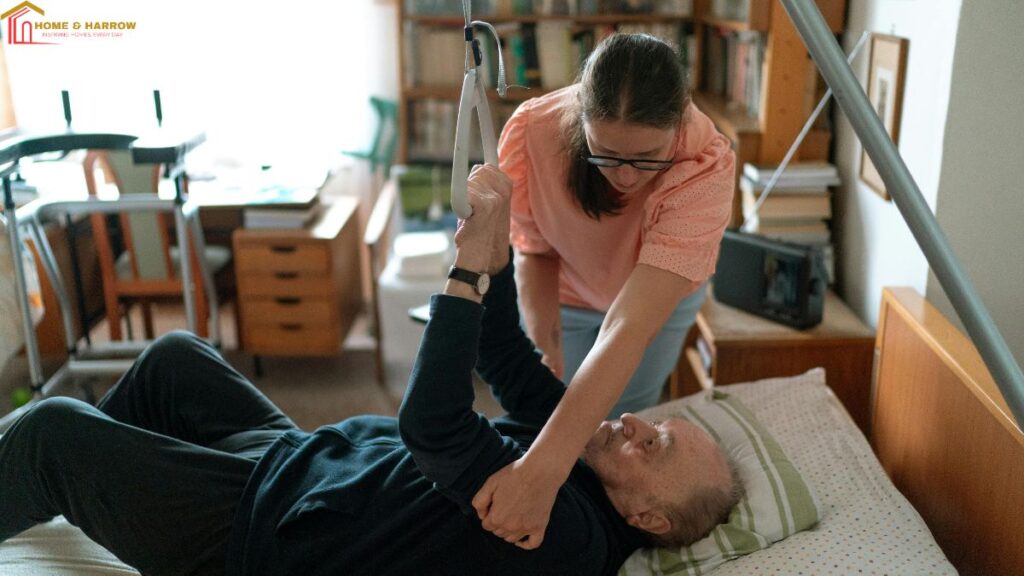Introduction
Preferred home health care as we examine the landscape of post-operative and senior care in 2025, a clear pattern emerges: families are increasingly turning to professional home healthcare. The traditional image of institutional care is giving way to a more customized, thoughtful, and reliable model that enables people to heal and age in the comfort of their own homes.

We will explore the nuances of this decision, analyzing everything from the concrete scientific benefits to the extensive psychological and financial benefits. You will acquire a clear understanding of the services offered, how innovation is changing care in your Home, and why the individualized approach of preferred home healthcare is setting a new standard. Whether you are preparing for a parent’s future requirements, arranging post-surgery support, or exploring alternatives for a member of the Family with a chronic condition, this article will supply the credible information you require to make an informed and positive choice.
Comprehending the Home Health Care Landscape in 2025
The idea of receiving treatment in your Home is not new, but its modern iteration is even more comprehensive and innovative than ever before. Today’s favored Home healthcare companies are sophisticated organizations that supply a broad spectrum of services, ranging from knowledgeable nursing and physical therapy to specialized dementia care and telehealth monitoring. This advancement is a direct response to the changing requirements and expectations of families, the growing senior population, and advancements in medical technology.
What is Preferred Home Health Care?
Preferred Home Health Care refers to agency-managed, expert medical and non-medical assistance offered in a patient’s residence. Unlike personal or independent caregivers, these services are provided by a team of certified, vetted, and monitored professionals. This structure ensures a higher standard of care, regulatory compliance, and responsibility.
A key distinction is the “preferred” status, which indicates a service provider that has been chosen by families, medical facilities, and doctors for its constant quality, positive client outcomes, and extensive service offerings. These agencies typically have strong relationships with local healthcare systems, facilitating smooth transitions from health centers to Home.
Services provided under this model can be broadly classified:
- Skilled Nursing Care: Administering medications, injury care, IV treatment, and handling complicated medical conditions.
- Therapeutic Services: Physical treatment, occupational therapy, and speech-language pathology to bring back function and independence.
- Chronic Disease Management: Specialized programs for conditions like diabetes, COPD, cardiac arrest, and dementia.
- Personal Care Assistance: Help with activities of day-to-day living (ADLs) such as bathing, dressing, and meal preparation.
- Palliative and Hospice Support: Comfort-focused care to enhance the lifestyle for individuals with major diseases.
This integrated technique ensures that every aspect of an individual’s well-being is addressed, making it a holistic solution for intricate health needs.
1. Superior Clinical Outcomes and Personalized Care Plans
One of the most compelling factors that families choose as a favored Option for Home health care is the evidence of better health outcomes. When care is tailored to the specific needs and provided in a familiar environment, clients typically recuperate faster and manage persistent conditions more effectively.
The Power of a Personalized Care Plan
Upon beginning services, a registered nurse or therapist from a preferred firm conducts a thorough assessment at the patient’s Home. This isn’t simply a medical examination; it’s a holistic evaluation that considers the patient’s medical history, physical abilities, cognitive function, social support group, and Home environment.

Based upon this assessment, a highly customized care plan is established in cooperation with the patient, their Family, and their doctor. This plan is a living document that is continually updated to reflect the patient’s development and changing needs.
This level of customization is challenging to attain in an institutional setting where care is typically standardized to accommodate a bigger population. In your Home, the focus is singular: one patient, one strategy. This targeted approach leads to numerous clinical benefits:
- Reduced Hospital Readmissions: Home health care professionals are trained to identify early warning signs of issues. By stepping in quickly — whether by changing medication, providing client education, or interacting with the medical professional — they can prevent a minor problem from intensifying into a crisis that requires rehospitalization.
- Improved Medication Adherence: Managing multiple prescriptions can be frustrating. Home health nurses ensure that medications are taken correctly and on time, informing patients about their purpose and potential adverse effects. This crucial, however easy service significantly improves the efficiency of treatment and prevents unsafe errors.
- Effective Management of Chronic Diseases: For patients with conditions like diabetes, heart failure, or COPD, constant monitoring and education are crucial. A Home health nurse can teach a patient to monitor their blood sugar, recognize the signs of fluid retention, or utilize their oxygen devices correctly. This empowerment leads to improved self-management and a decrease in emergency clinic visits.
The Home Environment Advantage
The physical and psychological convenience of Home plays a vital role in healing. Patients sleep better in their own beds, eat more familiar food, and are surrounded by the memories and people they enjoy.
In addition, getting treatment at Home is naturally more useful. A physiotherapist can create exercises that utilize the patient’s own furnishings and navigate the real layout of their Home– like practicing climbing the stairs they will use every day or learning how to get in and out of their own shower securely. This real-world rehabilitation is much more reliable than exercises performed in a generic fitness center setting.
2. Boosted Safety and Reduced Risk of Infection
Healthcare facilities and long-lasting care centers, despite their best shots, are environments where infections can spread. Patients in these settings are often in proximity to others with compromised immune systems, increasing the threat of healthcare-associated infections (HAIs).
Producing a Safe Haven at Home
Bringing care into the Home substantially alleviates this threat. The client is not exposed to pathogens that can be transmitted in a shared living environment. Preferred Home health care firms follow rigorous infection control protocols, with clinicians using personal protective equipment (PPE) and adhering to extensive hand hygiene practices.
Beyond infection control, Home health experts play an essential role in producing a safer living environment. During the preliminary assessment and subsequent checkouts, they perform a comprehensive Home security assessment, recognizing and attending to prospective dangers such as:
- Fall Risks: Poor lighting, loose carpets, electrical cables, and the absence of grab bars prevail as dangers. A therapist can advise basic modifications, like rearranging furniture or setting up a shower seat, to dramatically decrease the threat of falls– a leading reason for injury and hospitalization amongst older adults.
- Fire and Emergency Hazards: Clinicians look for working smoke detectors, clear fire escape routes, and ensure the patient or household has a clear plan for what to do in an emergency.
- Nutritional Safety: They assess the kitchen for food security, making sure the fridge is at the appropriate temperature and that old or expired food is disposed of.
By proactively determining these threats, Home healthcare transforms the Home into a sanctuary for recovery, offering comfort for both the client and their household.
3. Greater Independence, Dignity, and Quality of Life
For many, the worry of losing self-reliance is as daunting as the health problem itself. The ability to make one’s own choices — what to eat, when to wake up, and who to see — is essential to our sense of self. Institutional care, by its very nature, involves a degree of regimentation that can strip away this autonomy.
Cultivating Autonomy Through Supportive Care
Preferred Home Healthcare is created to do the opposite. Its objective is to empower people to live as independently as possible for as long as possible. Instead of taking control, therapists and caretakers provide the necessary support to help the client preserve their routines and lifestyle.
This may imply:
- An occupational therapist is dealing with a stroke survivor to relearn how to prepare a leisurely meal in their own kitchen.
- A Home health assistant helping with bathing and dressing, permitting the individual to conserve energy for a social getaway with pals.
- A physiotherapist assisting a patient post-knee replacement regain the strength to walk their pet in the park.
Patients are not simply recipients of care; they are active individuals in their own recovery and daily life. This conservation of identity and control is essential and directly contributes to an overall higher quality of life.
4. The Integration of Advanced Technology in Home Care
Home healthcare in 2025 is significantly enhanced by technology. Innovations that were once confined to healthcare facilities are now seamlessly incorporated into the Home, permitting a level of tracking and interaction that was formerly inconceivable.
Telehealth and Remote Patient Monitoring (RPM).
Telehealth is a cornerstone of modern Home healthcare. It enables virtual visits with nurses, therapists, and even physicians, reducing the need for stressful travel and providing timely access to medical expertise. A client can undergo a video assessment to discuss a new symptom, or a therapist can remotely assist them with a workout regimen.

Remote Patient Monitoring (RPM) takes this action further. Clients are provided with user-friendly gadgets to track key vital signs from Home.
- Digital Blood Pressure Cuffs.
- Pulse Oximeters (to measure oxygen levels).
- Digital Scales (to keep an eye on for fluid retention in heart failure clients).
- Glucometers (for blood sugar level tracking).
This information is transmitted instantly and firmly to the Home health company’s clinical team. Nurses monitor the readings in real-time, trying to find patterns or any readings that fall outside the physician-prescribed criteria. If a concerning reading is discovered, the nurse can step in immediately — calling the patient to address the issue, scheduling an in-person or virtual check-up, or notifying the doctor. RPM serves as a virtual safeguard, providing constant oversight and enabling proactive, rather than reactive, care.
Other Technological Aids.
Beyond telehealth, other technologies improve security and connection.
- Personal Emergency Response Systems (PERS): Modern “I’ve fallen and I can’t get up” buttons are now advanced devices with automated fall detection, GPS tracking, and two-way interaction, providing an immediate link to assist in an emergency.
- Automated Medication Dispensers: These devices can be pre-filled by a nurse or Family member and are programmed to dispense the correct tablets at the appropriate time, sounding an alarm and sending an alert if a dosage is missed.
- Family Portals: Secure online platforms enable members of the Family (with the client’s authorization) to view the care schedule, check out notes from the clinician’s visits, and communicate directly with the care team, keeping everyone notified and engaged.
This blend of high-touch and high-tech care makes Home health care in 2025 a robust, dependable, and highly effective option.
5. Considerable Cost-Effectiveness and Financial Benefits.
While the choice is hardly ever based on cost alone, the financial advantages of Home healthcare are undeniable and considerable. When compared to the alternatives, care in your Home often represents the most economical solution for supplying premium, long-lasting assistance.
Comparing the Costs: Home Care vs. Institutional Care.
The expenditures related to institutional care can be shocking.
- Nursing Home Care: A semi-private or private space in a knowledgeable nursing center can cost 10s of thousands of dollars per year, a cost that rapidly depletes life savings.
- Assisted Living Facilities: While cheaper than nursing homes, these centers still represent a significant regular monthly cost, and they generally do not provide the level of knowledgeable medical care offered by a Home health agency.
- Hospital Stays: An extended healthcare facility stay is the most costly kind of care. By avoiding readmissions and complications, Home health care straight lowers these costs.
On the other hand, Home healthcare is generally supplied periodically —a nurse might visit a few times a week, and a therapist may come twice a week. The cost is based solely on the services required, for the time they are needed. For most clients who do not require 24/7 guidance, this design is significantly more economical.
Insurance and Medicare Coverage.
Most importantly, many of these services are covered by insurance. Medicare, in particular, has robust protection for Home health care for qualified recipients. To qualify for the Medicare Home Health benefit, a client must:
- Be under the care of a medical professional and be getting services under a plan of care established and evaluated frequently by a physician.
- Need, and a doctor needs to license that they require one or more knowledgeable services (nursing, physical therapy, etc).
- Be “homebound,” implying it is tough to leave Home, and they require help to do so.
When these criteria are satisfied, Medicare can cover the full cost of skilled services in the Home for a specified period. Many personal insurance coverage strategies, Medicare Advantage plans, and VA benefits likewise offer comprehensive Home healthcare coverage. Preferred companies have committed staff who are professionals at navigating these benefits and ensuring that households can maximize their available coverage.
6. Unequaled Convenience and Relief for Family Caregivers.
Caring for an elderly one is a worthy act; however, it can also be physically and mentally exhausting. Family caretakers typically juggle their own tasks, kids, and individual duties, leading to high levels of stress, burnout, and even health issues of their own.
Expert Support as a Lifeline.
Preferred Home Healthcare provides a vital lifeline for these families. It does not replace the Family’s love and involvement; it supplements it with professional proficiency and reputable support. Understanding that a certified professional is handling the intricate medical tasks offers immense peace of mind.
This assistance enables the Family member to focus on what matters most: providing emotional support and enjoying quality time with their loved one. The dynamic can shift from that of a stressed caretaker to that of a loving partner, kid, or grandchild once again.
The Home remains the central hub for the Family, with routines interrupted as little as possible. It eliminates the time, expense, and stress of traveling back and forth to a facility, allowing life to continue with a higher sense of normalcy for everyone involved.
Conclusion: The Clear Choice for Modern Family Care.
The decision to choose a course of care for a loved one is a profoundly personal one. As we’ve explored, the reasons households are progressively choosing preferred Home health care in 2025 are complex and engaging.

Powered by technology that enhances security and communication, and supported by a structure that provides significant monetary and emotional relief, Home health care is no longer an alternative —it is the standard-bearer for compassionate, efficient, and contemporary healthcare. By bringing expert clinical care into the familiar and healing environment of the Home, preferred Home healthcare companies empower patients to recuperate much faster, live more fully, and remain where they most desire to be: in their Home, surrounded by Family, and in control of their lives.
Often Asked Questions (FAQ).
Q1: How do I discover a reputable “preferred” Home health care agency?
Start by requesting recommendations from your loved one’s physician, the health center discharge organizer, or friends who have actually used these services. Look for companies that are Medicare-certified, as this indicates they fulfill federal health and safety standards. Inspect online reviews and ask the firm about the credentials, training, and emergency management practices of their personnel.
Q2: What is the distinction between Home health care and individual care/companion care?
Home healthcare is a type of medical care prescribed by a physician, including services provided by registered nurses and certified therapists. It is often covered by Medicare or personal insurance coverage. Personal or buddy care is non-medical and assists with activities of daily living, such as transportation, cooking, and bathing. While some Home health agencies provide both, individual care is usually paid out of pocket.
Q3: Can home healthcare handle complex conditions like dementia or Alzheimer’s?
Yes, many preferred Home healthcare firms offer specialized programs for dementia and Alzheimer’s care. These programs employ personnel with specialized training in managing cognitive decline, interaction techniques, and behavioral symptoms. They focus on creating a safe and structured environment in the house to reduce confusion and anxiety for the patient.
Q4: How long can someone receive Home health care services?
The period of care depends upon the client’s medical requirements and their doctor’s orders. For post-operative healing, it may take a few weeks. For chronic illness management, services can be re-certified and continued for numerous months or even years, as long as there is a competent need and the client continues to meet the eligibility criteria (such as being homebound for Medicare).
Q5: What takes place if our regular Home health nurse or therapist is sick or on vacation?
A significant benefit of using a favored company versus a private caretaker is dependability. The firm is responsible for staffing all arranged checkouts. If your leading clinician is unavailable, the firm will appoint another qualified and vetted expert to provide care, ensuring continuity of support for the client.
Q6: Is my Home suitable for Home healthcare? Do I require special devices?
The majority of homes are suitable for occupancy. During the initial evaluation, the clinician will assess the Home for security and may suggest basic, low-cost modifications, such as removing throw rugs or enhancing lighting. Suppose specialized medical equipment (like a hospital bed or oxygen concentrator) is needed. In that case, the agency will collaborate with a medical supply business to have it delivered and set up, and this is typically covered by insurance.
As we examine the landscape of senior and post-operative care in 2025, a clear trend emerges: households are increasingly turning to expert home healthcare. You will acquire a clear understanding of the services offered, how innovation is transforming care at Home, and why the individualized method of favored Home health care is setting a new standard. Today’s favored Home health care firms are advanced organizations that provide a broad spectrum of services, from skilled nursing and physical treatment to specialized dementia care and telehealth tracking. Home health care is competent medical care prescribed by a physician, involving services from registered nurses and licensed therapists. Yes, numerous favored Home health care firms have specialized programs for dementia and Alzheimer’s care.

